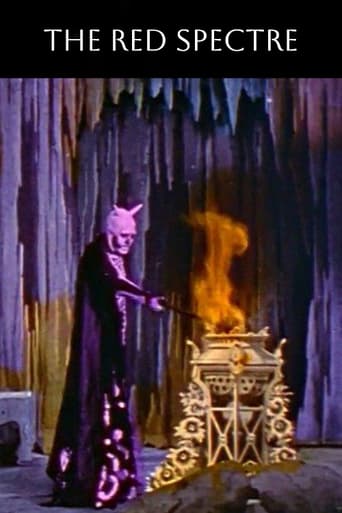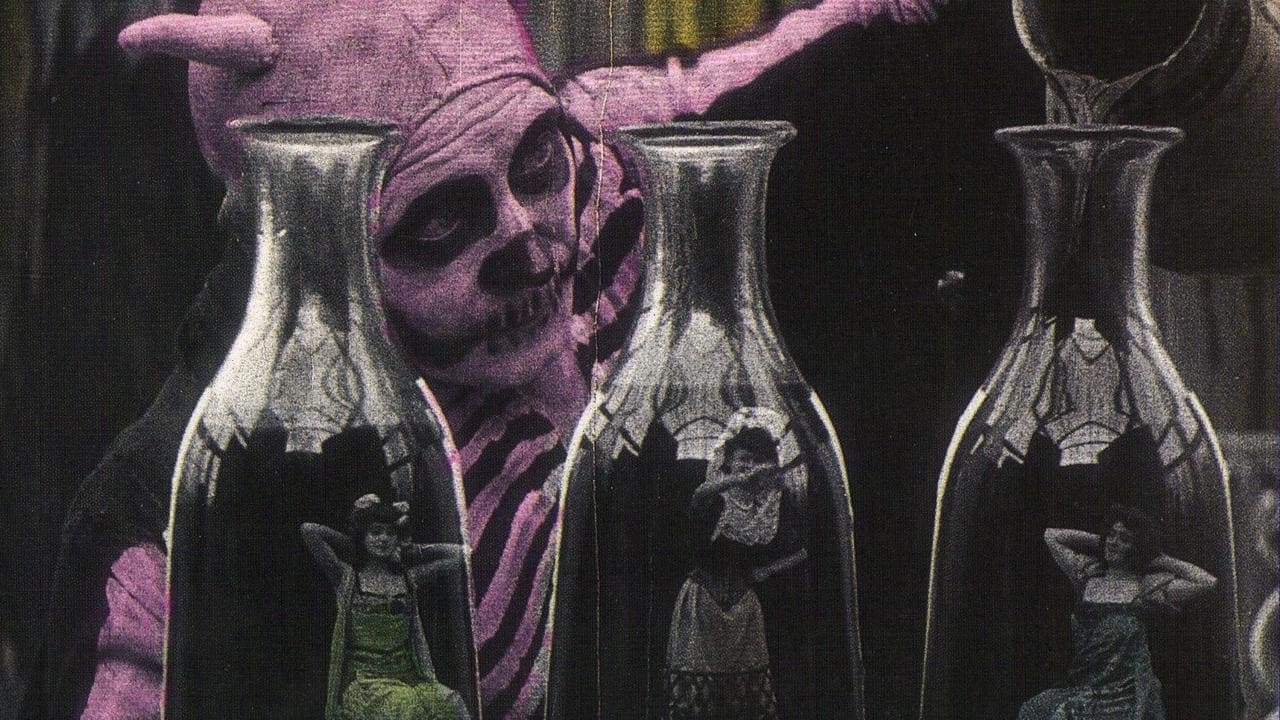punishmentpark
I must say I had expected more of this, though I did quite enjoy myself. I came across a version without music, but I'm sure it's not intended that way, so I chose some Spanish guitar songs from Pepe Romero to play as soundtrack, and it sufficed for the greater part.The 'story' was pretty hard to follow, although all there seems to be going on is a horned reaper / magician performing his black arts on some harmless, innocent women (but are they ever...?), but in the end he meets his demise through one of them.It's full of visual playfulness and ingenuity that makes it quite pleasing to the eye, though I had expected a little more in terms of different settings and such.Still, this is very much up my alley. 8 out of 10.
Michael_Elliott
The Red Spectre (1907)** 1/2 (out of 4) Mildly entertaining French film from director Ferdinand Zecca was clearly influenced by the work of Georges Melies. In this film, in what appears to be Hell or something like it, a skeleton brings to life a couple women and then begins to do various tricks with them. That's pretty much everything you need to know in regards to the story as everything else is just one trick after another. There are a few good things about this film but at the same time it's just so easy to see that it's no where near the league of Melies and you have to feel that the French master was doing this type of film a decade earlier and doing it much better. I think the biggest problem is that there's really no strong pacing and after a while the 9-minute running time just feels like it's dragging along. There are several of the tricks, which simply aren't that entertaining and for one good example just check out the one where the skeleton wraps a woman up in some sort of tarp. How the trick was done is easy to spot. There are some good things however and this includes the scenery, which is quite nice to look at. The biggest highlight has to be the very good tinting and especially the reds.
AnnieLola
"The Red Spectre" is simply a themed stage magician's routine enhanced by trick photography. One needn't trouble over any real plot line, and there isn't any point to what happens to the women in the routine; they're all Lovely Assistants assisting the magician! Notice how they pose becomingly in their pretty costumes, preen, dance and nod to the audience? Even the three shown miniaturized in the milk bottles look quite happy and pleasant, since they're just doing their job of being decorative parts of the act. The "Good Fairy/Spirit" looks more like a rival magician (notice her bat-winged cape), and far from being a contest between Good and Evil, it's more a challenge between equals. This adds a bit more narrative, an element of conflict, but really doesn't seem intended to convey any deep significance. The sorceress is almost another Lovely Assistant, just with a more active role and showing more leg. Notice that far from deploring his dark powers, she appears to absorb them herself at the last by assuming his cloak after having vanquished him. This is a charming example of stage technique of the time, and the final scenery effects and beauty pageant are quite delightful. Just watch it as an old-time magic act and it makes perfect sense!
wmorrow59
The first decade of the twentieth century saw the production of dozens of brief "trick films" which pushed the boundaries of the new medium, and France was the capital of this activity. Georges Méliès is the best known creator of these films, but The Red Spectre, which was produced at the Pathé Studio as a collaboration between Méliès' fellow pioneers Ferdinand Zecca and Segundo De Chomon, is perhaps the most bizarre and fascinating of them all. Or at least, allowing for the fact that so many of these films are lost, it certainly ranks with the best of the survivors. It is better seen than described, genuinely dreamlike in its images and transitions, and quite strange, but quite satisfying as well. The action lasts only about 8 or 9 minutes, but when it's over you feel as if you've been permitted to visit another world. When The Red Spectre was first exhibited the black & white footage was hand-colored to produce a dazzling effect, and happily, this material survives: a color print was discovered in a junk-yard in Mexico, and purchased for $25.00!Our setting is a mysterious underground grotto, and our "host" is a demonic magician who seems to be toying with the souls or spirits of several captive women. He causes them to levitate, then burst into flames; he captures their ashes in bottles, brings them back to life in miniaturized form, etc. The magician is opposed throughout by a Good Fairy who resembles Peter Pan (portrayed by a woman, as Peter traditionally is on stage). The precise meaning of the action is difficult to determine at times, but the central conflict amounts to a struggle between the forces of Good and Evil.One effect is especially notable: when the wicked magician produces three glass bottles, each holding a tiny woman prisoner, and brings them downstage to allow for a close-up, the scene instantly reminds latter day viewers of a similar sequence in The Bride of Frankenstein (1935). Did James Whale see this film, or is the similarity a coincidence? Notable, too, is the depiction of a device very much like television-- strongly suggested by the evil conjurer's magic screens, each of which depicts a series of moving images. Here's a real cinematic milestone: a film that predicts the coming of T.V., and, on top of that, attributes its invention to a demon!


 AD
AD
